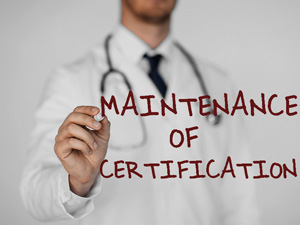
Following is the President’s Message from the winter 2017 issue of The Ohio Family Physician by Don Mack, MD, that provides a historical overview of maintenance of certification, current legislation being considered by Ohio’s lawmakers, and the response take by the Ohio Academy of Family Physicians and the American Academy of Family Physicians.
When I completed my family medicine residency in 1987, I knew that I would sit for the American Board of Family Medicine (ABFM) exam every seven years during my medical career. This was in contrast to colleagues in many specialties that had a single, high stakes exam. The premise was that if I committed to continuous continuing medical education and recertifying exams, I would be a better physician. This was subsequently proven by systematic reviews of the evidence revealing that physicians with more years in practice had less accurate knowledge of appropriate standards of care and may also have poorer patient outcomes.1
In 1998, the American Board of Medical Specialties (ABMS), which is now composed of 24 member boards including the ABFM, established a Task Force on Competence to ensure that specialists maintained current knowledge and skills throughout their careers. This task force developed the concepts that led to a new process which was called Maintenance of Certification (MOC). By 2006, all of the ABMS member boards had completed development and received approval for their individual MOC programs. The foundational concept of these programs is that specialty physicians are best able to define the standards for their specialty colleagues. Together with the Accreditation Council for Graduate Medical Education, the ABMS jointly set the competencies for this process which are professionalism, medical knowledge, patient care, interpersonal and communications skills, systems-based practice, and practice-based learning and improvement.2
At the same time specialty boards were developing this process, health care in the United States fell under increased scrutiny because of high cost and quality concerns. The Institute of Medicine consensus report, Crossing the Quality Chasm: A New Health System for the 21st Century, warned that our health care system frequently was fragmented with variation across the country. This widely-publicized report continued to fuel the public demand that physicians prove maintenance of their abilities to practice their medical specialty. Demonstration of value and evidence-based improvement was vital. How exactly to achieve that was not as clear. It should be noted that, originally, board certification and MOC were understood to be a voluntary act of professionalism – one of multiple mechanisms, not the only mechanism, by which the public could be assured of physicians’ medical competence.
This brings us to today. The American Academy of Family Physicians has consistently supported the principle of professional self-regulation, believing that it is the responsibility of individual physicians and the organizations that serve them to establish and uphold standards that facilitate physicians’ continuing professional development and improvement in the quality of care they provide to patients. The public calls on us to demonstrate that we are self-regulating our specialty.
Competing forces argue the merits of MOC and whether participation in the process does actually improve quality in our specialty. While many will disagree, evidence is growing that MOC has benefits. According to David Johnson in his article about MOC, peer-reviewed literature supports that board certification and recertification are associated with improved patient care, greater adherence to guidelines, fewer state board disciplinary actions, and less costly care. Additionally, patients prefer board-certified physicians and expect periodic recertification.5 Finally, a study by Eric Holmboe and his colleagues also justifies the need for MOC by finding that physician cognitive skills as measured by a MOC examination, are associated with higher rates of processes of care such as completing hemoglobin A1C testing in diabetes for Medicare patients.6
The Academy understands and shares family physicians’ concerns regarding the cost (in both time and money) of participating in ongoing certification, particularly the high stakes exam. The board certification process itself is, undoubtedly, a contributing factor to the physician burnout syndrome so prevalent in medicine today. In an article by Cook, et al,4 physicians across multiple specialties in the United States responded to their survey noting the burden and their dissatisfaction with MOC. It is no wonder that some physicians have sought and support legislative action to prevent specialty board certification and maintenance from being mandated or used as a sole criterion for decisions involving credentialing, privileging, payment, employment, or licensure. In April 2016, Oklahoma adopted a bill becoming the first state to enact a law aimed at removing MOC as a requirement for licensure, employment, payment, credentialing, and privileging. According to the American Medical Association Advocacy Resource Center, several states have bills working their way through the legislative process. In Ohio, House Bill (HB) 237 states that MOC cannot be a requirement of insurance payment or hospital privileges. While the ABFM has been clear that MOC should not be a criterion for licensure, credentialing, privileges, or payment, that standard still sometimes exists.
We have many demands on our time, and not having MOC to complete would seem on the surface to make our lives a little easier. But, in the spirit of professional self-regulation, are board certification and MOC processes best addressed through the state legislative process or internally within our certification boards? Do we really want the government defining ongoing certification standards for medicine or for any other profession for that matter? Does legislation like HB 237 open a door that might eventually lead to diminished professional self-regulation?
In a board report presented during the 2017 AAFP Congress of Delegates, the AAFP affirmed its commitment “to the principles of lifelong learning, continuing professional development, clinical expertise of the health care workforce, and professional self-regulation, including assessment mechanisms to assure the public that the care they receive is evidence-based and high quality.”
The report goes on to say, “The AAFP is also committed to advocating for assessment mechanisms, such as those utilized in MOC programs, to be evaluated and enhanced to maximize their relevance and minimize their cost. In addition, the AAFP is committed to advocating for the appropriate use of board certification and MOC as only one component of professional self-regulation rather than an absolute requirement in the determination of clinical privileges, credentialing, licensure, payment, and employment.”
- Evaluation of alternatives to achieve ongoing board certification in family medicine
- Development of additional recommendations to the ABFM (and potentially to other certifying boards) regarding options for achieving demonstration of knowledge in addition to a secured proctored exam and submission of patient quality data
- Development of AAFP policy regarding professional self-regulation and MOC including addressing the appropriate use of MOC for credentialing, privileging, payment, and employment by external stakeholders including hospitals, licensing entities, payers, and employers, and recognition that board certification is voluntary and should not be used as an absolute requirement for such purposes as noted above
- Development of AAFP policy regarding criteria by which members and others can evaluate specialty certifying boards
- Consideration of other aspects of board certification of family physicians as necessary to address concerns raised in the AAFP Board Report on Certification in Family Medicine.
Each day family physicians make decisions for our patients weighing the pros and cons of any treatment. The decision making process isn’t necessarily straightforward or easy. Likewise, when it comes to MOC, your Ohio Academy of Family Physicians will remain alert to the current legislative initiatives and continue to process this information through Academy resources, our Public Policy Committee, and board meetings. Our effort will be to continually work for our member physicians, evaluate the many aspects of MOC, and advocate for the specialty of family medicine.
- Choudhry NK, Fletcher RH, Soumerai SB. Systematic Review: The Relationship between Clinical Experience and Quality of Health Care. Ann Intern Med. 2005;142:260–273.
- Puffer, JC. The Evolution of Physician Certification and the Canary in the Coal Mine. Mayo Clinic Proceedings. 2016;91:1325-1327.
- Institute of Medicine. Crossing the Quality Chasm: A New Health System for the 21st Century. The National Academies Pr, Washington, DC; 2001
- Cook, D.A., Blachman, M.J., West, C.P., and Wittich, C.M. Physician attitudes about maintenance of certification: a cross-specialty national survey. Mayo Clin Proc. 2016; 91: 1336–1345
- Johnson, DH. Maintenance of Certification and Texas SB 1148: A Threat to Professional Self-regulation. JAMA. 2017 Aug 22;318(8):697-698.
- Holmboe ES, Wang Y, Meehan TP, Tate JP, Ho S, Starkey KS, Lipner RS. Association Between Maintenance of Certification Examination Scores and Quality of Care for Medicare Beneficiaries. Arch Intern Med. 2008;168(13):1396–1403.




